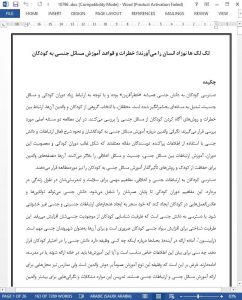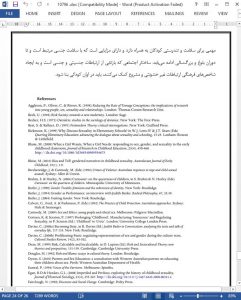ABSTRACT
Children’s access to sexual knowledge has always been considered ‘risky’ and controversial due to the fraught relationship between childhood and sexuality. Based on focus groups with children and their parents, the authors explore the relationship between risk and regulation associated with providing children with accurate knowledge about sexuality. Two main issues are examined: parents’ anxieties associated with educating their children about sexuality; and how children actively build narratives around relationships and sexual knowledge based on the fragments of information available to them. The authors argue that dominant constructions of childhood and childhood innocence negate the effective education of children around sexuality, gender and ethical relationships. Additionally, they examine the tensions that exist for many parents around the discourse of child protection and the ways in which this impacts on their education of young children about sexual matters.
Children’s access to knowledge about sexuality and ethical relationships has crucial implications for their health and well-being, not just in the early years but also throughout their lives. This knowledge can build children’s competencies and resilience, contributing to new cultural norms of non-violence in gendered and sexual relationships. It also develops children’s capacity to understand their own sexual subjectivity, which is critical for fostering their literacy with regard to sexual knowledge and is essential to their rights as sexual citizens (Robinson, forthcoming). However, debates continue about whose role it is to provide children with sexual knowledge, at what age it is appropriate to impart certain information, and whether this education should take place in the home or in schools. This area of education has been generally considered parents’ responsibility, but schools have increasingly become sites for the introduction of sexuality and relationships education. For many parents and educators, teaching children about these issues is fraught with difficulties and anxieties. These tensions can result in the family or schooling avoiding or not effectively addressing sex education with children (Robinson & Davies, 2008a; Goldman, 2010).
Conclusion
In order to contribute to children’s confidence, competence and resilience it is critical that parents are supported and educated about how best to communicate information about sexual matters to their children. This becomes difficult when the relationship between childhood and sexuality is one that is considered a private matter and is so regulated that there are few opportunities for parents and educators to have frank and honest discussions about these issues. In addition, western sociocultural values often contribute to the silencing of such conversations whether they are between adults, or adults and children. Educating children about sexuality was considered risky business by parents in our research. Parents’ practices in this area were heavily influenced by dominant discourses of childhood and childhood innocence. Parents were often acutely aware that it was critical to begin educating their children early about sexual matters to build their critical literacy in order to counteract popular cultural representations of gender and sexuality. However, many parents were concerned that they do not have the skills to teach their children about sexuality.









